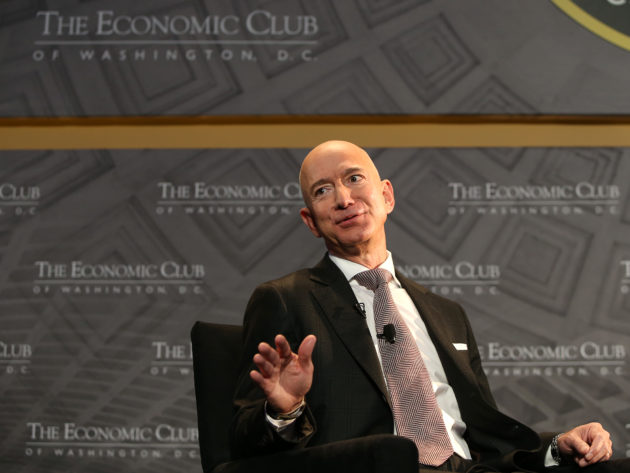
Jeff Bezos surprised some Amazon critics and followers this week by throwing his weight behind a federal corporate tax hike to help pay for President Biden’s infrastructure plan. It was a position that seemed out of step with his company’s history and the rest of corporate America.
A message from Jeff Bezos. https://t.co/ZAcpnaRu6z pic.twitter.com/81AkgVyQke
— Amazon News (@amazonnews) April 6, 2021
It raises the question: why are Bezos and Amazon breaking with their peers and supporting an increased corporate federal income tax rate?
Amazon has become emblematic of American corporations that amass staggering profits and are criticized for how much they pay in taxes. Bezos’ statement in support of a corporate tax hike this week appears to undercut that reputation.
His position also sets him apart from the rest of the corporate elite. The Business Roundtable, a powerful CEO association of which Bezos is a member, was quick to rebuke Biden’s plan and warn any tax increase could hurt American competitiveness.
There are several reasons why Amazon is supporting the increased tax rate. In short, it’s because Amazon doesn’t operate like any other company.
Amazon needs infrastructure
The most obvious reason Bezos is backing a tax hike to pay for infrastructure is Amazon, more than any other major tech company, needs infrastructure.
Accessible roads and bridges and a functioning post office are critical to fulfilling Amazon’s promise of delivering packages to customers on time. The large swaths of rural America without a broadband connection are also untapped markets for Amazon. If more people can easily access Amazon.com, more people can buy Amazon products.

Biden’s American Jobs Plan would spend more than $2 trillion to repair bridges, ports, airports, and transit systems. It pledges to bring high-speed broadband to every American and invest in research and development and technology jobs training.
Those programs could have major benefits for Amazon, but they don’t come cheap. Biden’s plan to fund the infrastructure package includes a 7% increase of the corporate tax rate to 28%. Under the 2017 tax overhaul, the rate was slashed from 35% to 21%. The proposal also seeks to close tax loopholes and discourage American companies from shifting profits offshore to reduce their tax obligations.
It’s not all about income tax

Since the earliest days at Amazon, the company has kept its federal tax bill low by reinvesting profits back into the company and taking advantage of the research and development tax credit, among other strategies.
For years Amazon reported little or no profits at all. Today, Amazon does post a profit but it’s not nearly as high as many other tech companies. That means a modest increase in the corporate income tax rate might not have a major impact on Amazon.
“When you look at the taxes that Amazon pays or does not pay, as well as other tech companies, it’s not just the corporate tax rate,” said Margaret O’Mara, a University of Washington historian and author of The Code: Silicon Valley and the Remaking of America. “Particularly in the case of Amazon, what’s as important, if not more important, are the other carve-outs in the tax code, notably the R&D credit.”
Jay Carney, Amazon’s policy and communications chief, tweeted this last week:
If the R&D Tax Credit is a “loophole," it's certainly one Congress strongly intended. The R&D Tax credit has existed since 1981, was extended 15 times with bi-partisan support and was made permanent in 2015 in a law signed by President Obama.
— Jay Carney (@JayCarney) March 31, 2021
“Amazon” has become shorthand among politicians across the aisle for multinational corporations that avoid paying their fair share of taxes, including the current and former president.
When Biden announced plans to rein in corporate tax avoidance to pay for his $2 trillion infrastructure bill last week, he singled out Amazon by name.
“A fireman, a teacher paying 22%, [and] Amazon and 90 other major corporations paying zero in federal taxes,” Biden said. “I’m going to put an end to that.”
Amazon earned Biden’s ire by paying $0 in federal income taxes for two years, according to several outside reports and analyses of the company’s finances. That record changed in 2019, when Amazon paid $162 million in federal income tax on $280.5 billion in total revenue.
In February Amazon said its 2020 tax contributions included about $1.7 billion in federal income tax expense. The company posted revenue of $386 billion last year and income before income taxes of $24.1 billion, boosted by a pandemic-driven surge amid as customers relied on its online shopping and cloud computing services.
Political brownie points
Underscoring Amazon’s support for the tax hike is an increasingly hostile political climate. Amazon has been a convenient punching bag for politicians across the aisle for years, but the criticism has intensified since Democrats took control of Congress and the White House.
Amazon is under public and government scrutiny for a variety of issues including antitrust concerns, and the working conditions of its lowest-paid employees.
Amazon’s diminishing popularity in Washington D.C. was on full display over the past few weeks, when prominent politicians from across the aisle including Biden waded into the battle to unionize Amazon warehouse workers in Bessemer, Ala. A sizable majority of warehouse employees voted against unionization on Friday.
Bezos’ willingness to accept a higher tax obligation to pay for popular infrastructure programs could be an effort to curry favor with the Biden administration and customers at a tenuous time for the company.
“We support the Biden Administration’s focus on making bold investments in American infrastructure,” Bezos wrote in his statement this week. “Both Democrats and Republicans have supported infrastructure in the past, and it’s the right time to work together to make this happen.”
from GeekWire https://www.geekwire.com/2021/amazon-jeff-bezos-backing-corporate-tax-rate-hike/